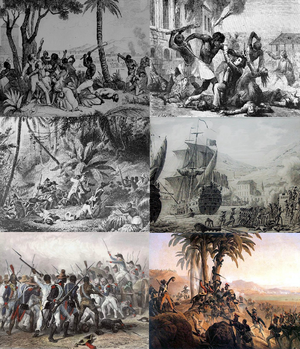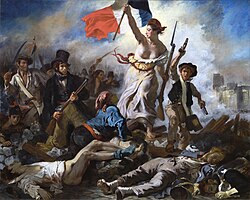
Back الثورة الهايتية Arabic Revolución haitiana AST Haiti inqilabı Azerbaijani هایتی اینقیلابی AZB Хаитянска революция Bulgarian Revolució haitiana Catalan Haitská revoluce Czech Haitianische Revolution German Haitia revolucio Esperanto Revolución haitiana Spanish
| Haitian Revolution | ||||||||||
|---|---|---|---|---|---|---|---|---|---|---|
| Part of the Atlantic Revolutions, French Revolutionary and Napoleonic Wars | ||||||||||
 | ||||||||||
| ||||||||||
| Belligerents | ||||||||||
1791–1793
|
1791–1793
|
| ||||||||
| Commanders and leaders | ||||||||||
1791–1793
1793–1798
| 1791–1793 1793–1798 1798–1801 1802–1804 |
| ||||||||
| Casualties and losses | ||||||||||
| Haitians: 200,000 dead[1] | British: 45,000 dead[1] | |||||||||
| History of Haiti |
|---|
| Pre-Columbian Haiti (before 1492) |
| Captaincy General of Santo Domingo (1492–1625) |
| Taíno genocide |
| Saint-Domingue (1625–1804) |
| First Empire of Haiti (1804–1806) |
| North Haiti (1806–1820) |
| South Haiti (1806–1820) |
| Republic of Haiti (1820–1849) |
| Second Empire of Haiti (1849–1859) |
| Republic of Haiti (1859–1957) |
| Duvalier dynasty (1957–1986) |
| Anti-Duvalier protest movement |
| Republic of Haiti (1986–present) |
| Timeline |
| Topics |
|
|
| Part of a series on |
| Political revolution |
|---|
 |
|
|
The Haitian Revolution (French: Révolution haïtienne [ʁevɔlysjɔ̃ a.isjɛn] or Guerre de l'indépendance; Haitian Creole: Lagè d Lendependans) was a successful insurrection by self-liberated slaves against French colonial rule in Saint-Domingue, now the sovereign state of Haiti.[2] The revolution was the only known slave uprising in human history that led to the founding of a state which was both free from slavery (though not from forced labour)[3] and ruled by non-whites and former captives.[4]
The revolt began on 22 August 1791,[5] and ended in 1804 with the former colony's independence. It involved black, biracial, French, Spanish, British, and Polish participants—with the ex-slave Toussaint Louverture emerging as Haiti's most prominent general. The successful revolution was a defining moment in the history of the Atlantic World[6][7] and the revolution's effects on the institution of slavery were felt throughout the Americas. The end of French rule and the abolition of slavery in the former colony was followed by a successful defense of the freedoms the former slaves had won, and with the collaboration of already free people of color, of their independence from white Europeans.[8][9][10]

The revolution was the largest slave uprising since Spartacus' unsuccessful revolt against the Roman Republic nearly 1,900 years earlier,[11][failed verification] and challenged long-held European beliefs about alleged black inferiority and about slaves' ability to achieve and maintain their own freedom. The rebels' organizational capacity and tenacity under pressure inspired stories that shocked and frightened slave owners in the hemisphere.[12]
Compared to other Atlantic revolutions, the events in Haiti have received comparatively little public attention in retrospect: historian Michel-Rolph Trouillot characterizes the historiography of the Haitian Revolution as being "silenced" by that of the French Revolution.[13][14][15]
- ^ a b c d Scheina. Latin America's Wars. Potomac Books. p. 1772.
- ^ Igawa, Momoko; Kato, Makoto (2017). "A new species of hermit crab, Diogenes heteropsammicola (Crustacea, Decapoda, Anomura, Diogenidae), replaces a mutualistic sipunculan in a walking coral symbiosis". PLOS ONE. 12 (9): e0184311. Bibcode:2017PLoSO..1284311I. doi:10.1371/journal.pone.0184311. hdl:2433/227462. PMC 5606932. PMID 28931020.
- ^ Ghachem, Malick W.; Danforth, Susan. "The Other Revolution". John Carter Brown Library. Brown University. Retrieved 11 March 2022.
- ^ Franklin W. Knight (February 2000). "The Haitian Revolution". The American Historical Review. 105 (1): 103–115. doi:10.2307/2652438. JSTOR 2652438.
- ^ Adam Hochschild (2005). Bury the Chains. Houghton Mifflin. p. 257.
- ^ "Why Haiti should be at the centre of the Age of Revolution – Laurent Dubois". Aeon Essays. Retrieved 4 September 2019.
- ^ Joseph, Celucien L. (2012). "'The Haitian Turn': An Appraisal of Recent Literary and Historiographical Works on the Haitian Revolution". Journal of Pan African Studies. 5 (6): 37–55.
- ^ Taber, Robert D. (2015). "Navigating Haiti's History: Saint-Domingue and the Haitian Revolution". History Compass. 13 (5): 235–250. doi:10.1111/hic3.12233.
- ^ Bongie, Chris (2008). Friends and Enemies: The Scribal Politics of Post/colonial Literature. Liverpool, UK: Liverpool University Press. p. 45. ISBN 978-1846311420.
- ^ Curtis Comstock, Sandra (2012). Incorporating Comparisons in the Rift: Making Use of Cross-Place Events and Histories in Moments of World Historical Change, a chapter in Anna Amelina, Beyond methodological nationalism: research methodologies for cross-border studies. Taylor and Francis. pp. 183–185. ISBN 978-0-415-89962-8.
- ^ Vulliamy, Ed, ed. (28 August 2010). "The 10 best revolutionaries". The Guardian. Retrieved 15 December 2015.
- ^ Philip James Kaisary (2008). The Literary Impact of the Haitian Revolution, PhD dissertation. University of Warwick. pp. 8–10.
- ^ Michel-Rolph Trouillot, Silencing the Past: Power and the Production of History.
- ^ Marlene Daut, Tropics of Haiti.
- ^ Hoel, 2021-et-la-revolution-francaise.